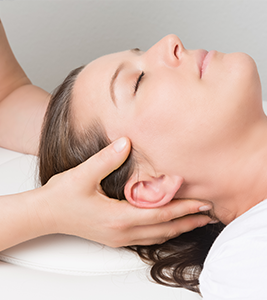
Do you feel dizzy when you sit up in bed or after laying down? Does turning your head rapidly or slowly when you walk throw you off your perception of balance? If yes, then Vestibular Rehabilitation can help. Vestibular Rehabilitation is a specialized type of physical therapy that is designed to help people who may be suffering from balance problems and dizziness.
Some of the more common vestibular disorders that can respond to physical therapy treatment include:
Benign Paroxysmal Positional Vertigo (BPPV) is the most common type of vestibular disorder. It is characterized by temporary dizziness and, in some cases, blurred vision when the head is held in certain positions. The reason the dizziness occurs with head movement is because you have small crystals in your ear that can become dislodged for unknown reasons. These crystals then become loose in either your anterior, posterior, or medial semi-circular canals. These canals contain fluid and hair that senses the position of your head in space. When the crystals become dislodged and are floating in these canals, it causes dizziness when the head is moved. BPPV can affect anyone at any time, but it typically occurs in people over 50 years of age.
A certified physical therapist with specialized training in Vestibular Rehabilitation can help in the treatment of BPPV by performing one of many manual therapy treatment options.
Vestibular Neuritis is a condition that is caused by inflammation of the vestibular nerve. This is the nerve that’s located in the ear that sends information to your brain about balance. When the vestibular nerve becomes inflamed, it becomes unable to communicate this information clearly. This results in disorientation and other symptoms, including:
In many cases, Vestibular Neuritis is caused by a viral infection and medications are typically used to help rid the body of the virus. Other drugs may also be prescribed, such as steroids and medications to help control nausea and reduce dizziness. When a virus is at fault, the condition usually resolves itself quickly. In some cases, dizziness can last for many weeks after treatment. For these patients, a balance-focused rehabilitation program is usually required.
Most balance-focused rehabilitation programs contain a mixture of body posture balance exercises, and eye-and-ear head-turn exercises performed both in the physical therapy office and at home. By repeating these exercises, the brain eventually learns how to adjust to the movements that cause dizziness and imbalance.
Ménière’s disease is a disorder of the inner ear that causes the individual to experience vertigo, tinnitus (ringing in the ear), hearing loss, and other symptoms. It usually starts in one ear but can sometimes involve both. Although it is a chronic condition, certain treatments can help improve the symptoms, including Vestibular Rehabilitation.
Much like Vestibular Neuritis, a customized physical therapy program can help restore the balance system (eyes, ears, and body) and reduce the dizziness that accompanies Ménière’s disease. Over time and with complete commitment to the program, the balance system will learn to cope with the problems experienced until most movements no longer provoke dizziness for the patient.
There is no single treatment that works for everyone with Vestibular conditions. Depending on how you react to Vestibular Rehabilitation, other treatments may be employed by your physical therapist, including:
It is important to note that for Vestibular Physical Therapy to be performed successfully, it requires specialized training and certification. As a result, we employ many Vestibular specialists at several of our clinics.
Call us today or click here to schedule an appointment for a professional assessment by one of our certified physical therapists, and get the highly specialized treatment you need to recover from your vestibular disorder.